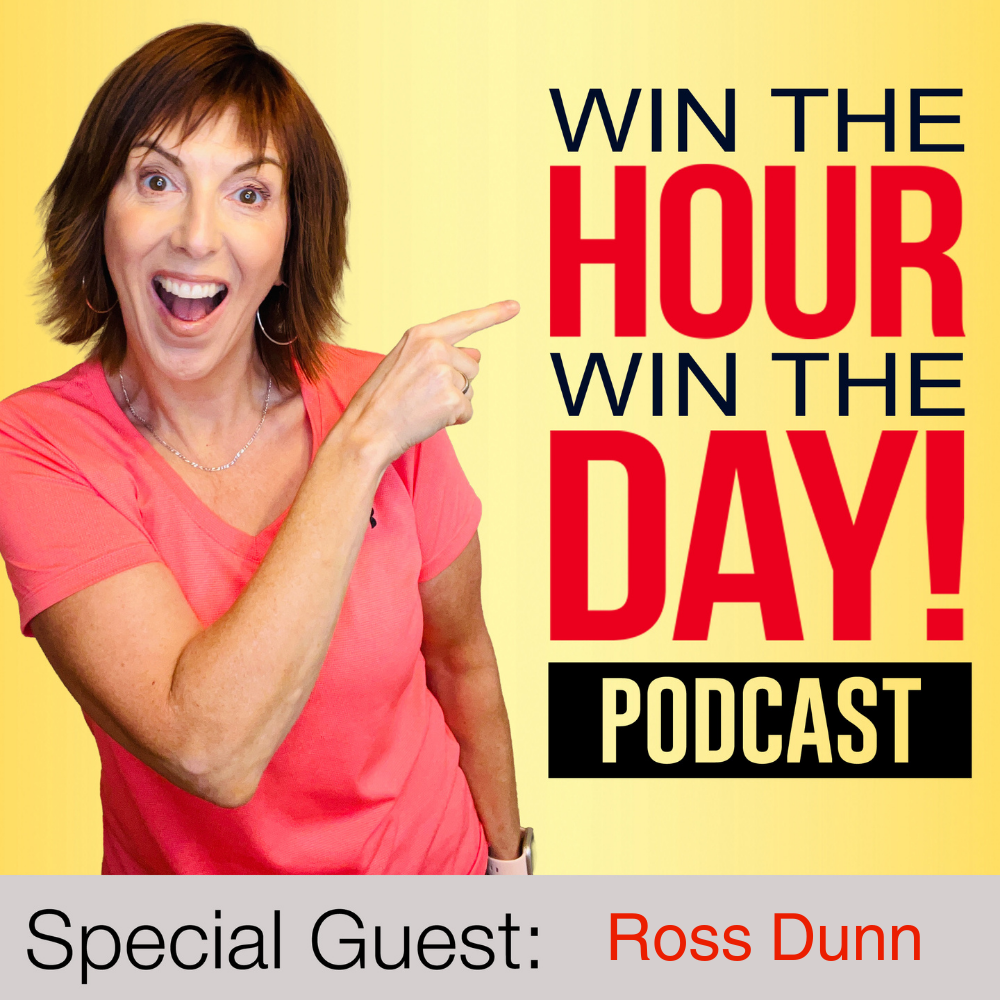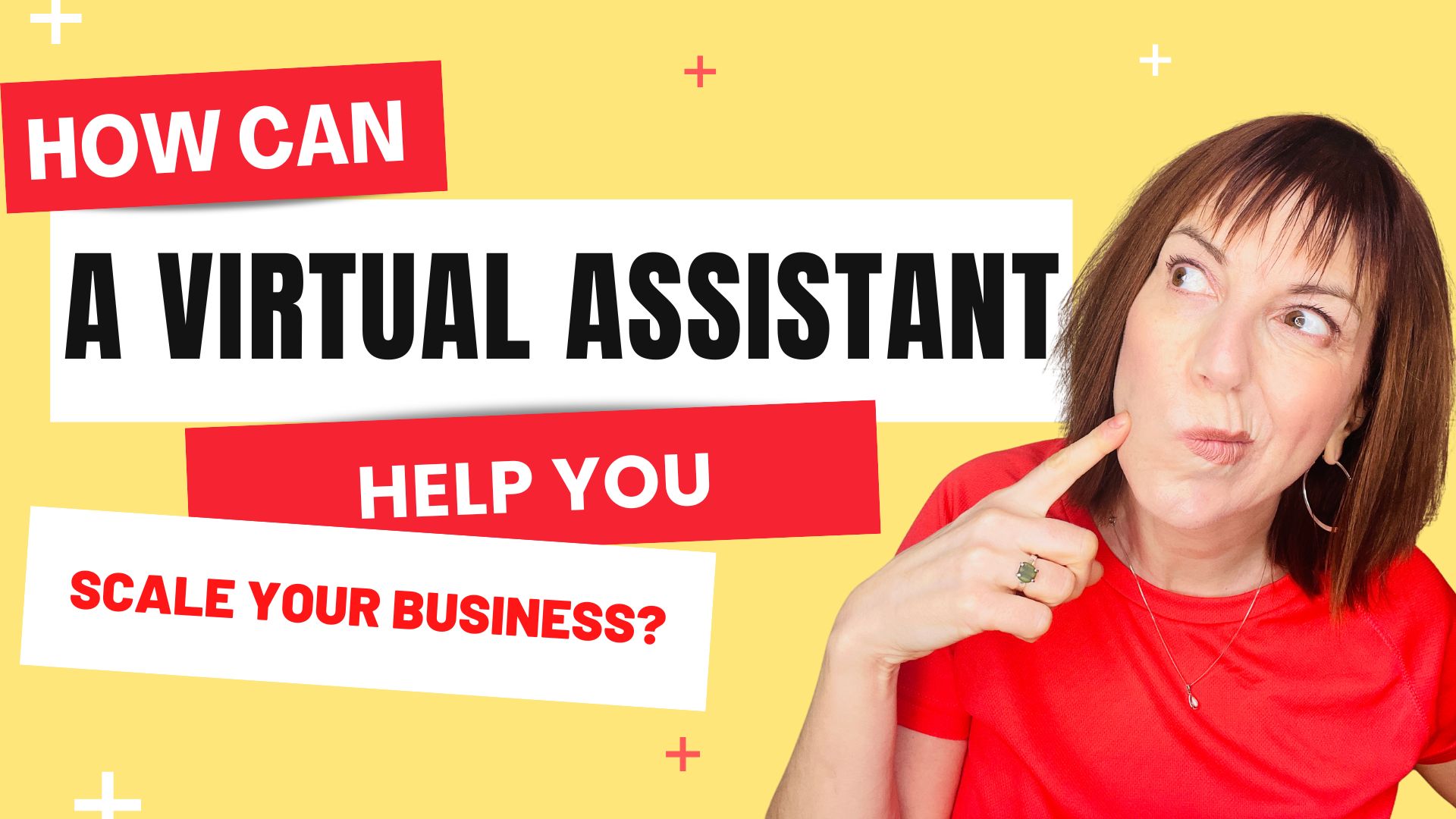Episode Summary
This week’s episode of Win The Hour, Win The Day Podcast interviews, Maura Malinang.
In this practical episode, you’ll learn:
-Why traditional SOPs slow you down and cause burnout.
-How Super Toolkits save time with simple, clear steps.
-The secret to avoiding decision fatigue and freeing up creative energy.
-How streamlined systems help VAs grow faster and get promoted.
Discover how easy systems can transform your team and your business. Don’t miss this game-changing episode!
Power Personality Quiz! http://winbacktimequiz.com/
Win The Hour, Win The Day! www.winthehourwintheday.com
Podcast: Win The Hour, Win The Day Podcast https://podcasts.apple.com/ca/podcast/win-the-hour-win-the-day/id1484859150
Facebook: https://www.facebook.com/winthehourwintheday/
LinkedIn: https://www.linkedin.com/company/win-the-hour-win-the-day-podcast
#KrisWard
#AuthenticStorytelling
#PublicSpeakingTips
Win The Hour Win The Day
https://winthehourwintheday.com
Maura Malinang Podcast Transcription
[00:00:00] Kris Ward: Hey everyone. Welcome to another episode of Win The Hour, Win The Day. And I am your host, Kris Ward. And today in the house, we have Maura Malinang, and she is going to tell us how to get, when you hire somebody, a virtual assistant, how to get to 80 percent capacity in one week, welcome to the show, Maura.
[00:00:18] Maura Malinang: Thanks for having me, Kris.
[00:00:20] Kris Ward: Okay. So Maura, when you were hired, it was actually, not the ideal time to be hired. You were hired about a week before Christmas and you started, you know what? I don’t know, January something, maybe second. And when I met with you, I did interview you, but I didn’t do any of the training that’s taken care of by our super tool kits.
[00:00:40] And we’ll dive into that. So when I met with you the next week, you were at 80 percent capacity of your job. Now, how does that happen?
[00:00:53] Maura Malinang: First of all, the onboarding process is really smooth because there is a super toolkit. There are our systems and processes. And I was able to be at an 80 percent capacity because there is already a systems or a super toolkits that I can follow, which I can read easily because the words there are universal language that we’re using and there’s a steps step by step process already there. It’s basically a spoon feed to me, which I just need to follow.
[00:01:25] Kris Ward: Okay. So first of all, for those who don’t know, we have this signature super toolkit and they are streamlined processes instead of SOP standard operating procedures tend to take very long to make.
[00:01:35] They’re clunky. They include training. It gets muddy fast. They’re usually not written by the end user. And they just never work. So you go to you make these processes, they get outdated quickly. So we have our signature super tool kit program. And one of the assets to that you’re referring to is the language.
[00:01:53] So our formula is called scale, subject, category, assets, language, and enlist. That’s the formula, how it’s set up. And for language, What happens when you speak of universal language, people might misunderstand that in a capacity of thinking, Oh, do you mean because you speak two languages or things like that, we’re talking about someone shouldn’t have to be in the job to understand.
[00:02:17] The language, right? So we don’t want to be talking about industry buzzwords or Oh, you know what she means when he does that? Or that’s our program here. So the language is huge because it’s simple, it’s directive, it’s clear. And to that example, we even have a glossary for the super toolkit. And in there, there’s words not to use like collaborate, consider, debate, develop, all these things like you have to know.
[00:02:41] You have to be able to move on to the next step. So I think for you, if you expand on language, it wasn’t that you didn’t understand it. It was just, it was concise and allowed you to move quickly through the work. Did you want to clarify? Am I correct on that?
[00:02:55] Maura Malinang: Yes. To add to that, Kris, I was actually more trained in my previous employment history to have a traditional SOP to be followed, which is basically an academic language that I’ve been using and it took me instead of taking at least one week for me to learn this kind of task it took me one month because it’s just not very easy to understand wherein our signature super toolkits it’s very universal that even a grade three student or grade three level students can understand our words.
[00:03:36] So yeah, it took me one week only to find how to navigate the platforms that we’ve been using because since I was a social media manager assistant there there are things that I’m not familiar with the tools that we’ve been -using. Yeah. And because of the super toolkits that we’ve been using or the systems and processes that we’ve been using it made me easier to navigate all those platforms.
[00:04:03] Kris Ward: Okay, so what you’re saying your previous jobs it often took you a month or so just to figure out what’s what like what do they mean when they say this and in ours it was just really clear and you’re up and running within a week. Another thing you brought up was the grade three level you’re like you know something grade three could read this.
[00:04:19] And what that’s about, and I think you can speak to this as well, is it’s not can people understand it, but what happens when you read those SOPs and other organizations, and it took you a month, and here it took you a week, is that it? It uses up your brain power, like it’s academic and you have to interpret it and you have to reread it and go, okay, hold on, what do they mean here?
[00:04:41] And my argument is, and we have clients that come in with them all the time, they’ve got these convoluted heavy documents and really it’s just to cover everything like liability okay, here’s everything you need to know on this topic, but you have to read it all. To know what you don’t need or how to get the work done.
[00:04:58] Whereas ours, it’s really just about getting idea to execution. So the grade three level you’re speaking of, it’s not that you couldn’t understand the academic stuff, but it allowed you to get to the real work quicker. And with brain cells, not all fatigued and tired from decision fatigue.
[00:05:14] Maura Malinang: Exactly. You don’t have to actually like for example, there is a word that has been used on a traditional SOP, which I don’t have any idea what that means I have to go look for the dictionary to that word. It’s like a jargon to me. We’re in. Yeah, it’s really different when how we use the universal language in our super toolkits.
[00:05:40] Kris Ward: Yeah, and I see that sometimes too when we’re dealing with new client and I’ll say I don’t like I’m reading their SOPs I’m like, I don’t understand this and they’re like you’d have to work here to know that it’s jargon I’m like then how would somebody knew like then it doesn’t work, right?
[00:05:54] And it’s if you’ve ever had to follow instructions or even build a desk or you get some new electronic Oh my gosh, I got this fancy scale last week that will tell me my body mass and all kinds of horrible things that maybe I don’t need to know about my body, fat percentage, muscle percentage.
[00:06:10] And I’m telling you, I, the TV was on the background and I had to shut it off and I had to read this manual twice to figure out how to do it. And I didn’t really concentrate. And I was just trying to weigh myself. When it got to me weighing myself at that point, I just have to stand on the scale, but my brain was fatigued.
[00:06:26] I had to focus. I haven’t okay, I’ll try to do this. And if you’re doing that all day long in the work day, then when you get to the work, you’re just worn out and you don’t know which end is up, especially when the job is new. What does this jargon mean? What do they mean by that? And when there’s all these steps.
[00:06:43] How do I know which ones are the important ones? With the super toolkit, it just moves you through really quickly. And I would say too. I think it’s a big key why you got promoted so quick, you moved so quickly and you just kept getting promoted and we kept seeing, cause you weren’t buried in admin work.
[00:07:01] We kept seeing your potential and the things that you were good at. So can you speak to that? Like I think from what you said, your previous jobs, you didn’t have this much, this many promotions or responsibilities.
[00:07:14] Maura Malinang: Yes, I’ve been like promoted for three times and I was able to accelerate my learning process because the systems and processes that we’ve been using, it just gives you more idea or get to the idea stage.
[00:07:29] And with the admin task, since we are using a universal language, I can pass it to someone that they can just follow the systems and processes easily. And because that’s, because we are using like a grade three level language.
[00:07:47] Kris Ward: Yeah. And I think you call it universal. I would tend to call it action language because what happens in so many of the other SOPs, there are words that are vague, say, evaluate how, what are you measuring?
[00:07:58] How do you evaluate it? If somebody has that SOP, evaluate. Whatever social media, it’s what are you measuring? When are you measuring? What time are you measuring? So that evaluate is very interpretive. And so that’s the thing is I would call it action language because it allows you to, really execute and get to it instead of vague words like, whatever discuss.
[00:08:20] Okay. We’ll discuss. That’s an SOP. Discuss the, we’ll discuss. How long do you discuss? Who do you discuss it with? So I think these action words. To your point, what you’re saying is when you got promoted, we didn’t slow down because you just handed your super toolkits off to the person that now is doing your job.
[00:08:39] It wasn’t like, oh we want to promote Maura, but then, oh, it’s going to take so long. And it’s going to have hiccups because now who’s going to do her job. And there, there was no backlash for you getting promoted. So that’s a, that’s another big thing. People will say to me, oh, it was a rough week because we hired somebody new or we promoted something or whatever. You think that super toolkits really aided you in your promotions?
[00:09:01] Maura Malinang: Yes. And to add to that, Kris, traditional SOPs in my mind is very long. Like you have to understand one paragraph just to go to the stage or to go to the next step. We’re in our SOPs. Our systems and processes is like just one simple sentence that everybody can understand. And I think that gives me more more time to get to the idea or to be more creative.
[00:09:29] Kris Ward: Yeah, you’re right. That’s a good point. I don’t even think like that anymore, but you’re right. All the other SOPs, often you’re actually reading paragraphs and then you’re like, okay, hold on. You, by the time you get to the end of the paragraph, you forgot what the beginning said.
[00:09:43] Nevermind that there’s five more paragraphs after that. So there’s a lot of reading and like people, it, the, Brain does this, we make about 35, 000 decisions in a day, just on basic stuff. And so then you just don’t under the maybe you do understand the power of decision fatigue because you, I’ve certainly done this back in the day before we created our signature super toolkits.
[00:10:06] I remember okay, I’d be working on a project and by the time I figured out where I was in the project, I would, my brain was fried, and so I was like, okay, I’ll pick this up tomorrow. Because I just had nothing left. And so what you’re saying is like I just get to the work and go through it and get quickly to what I need to do, which is the creative work.
[00:10:26] And that is a much bigger part of your hour where other people slow down and the bigger part of their time is sorting through their processes.
[00:10:37] Maura Malinang: Exactly.
[00:10:37] Kris Ward: Or they don’t use them at all because then they try to run off memory because the processes are so horrible. Then they go, Oh, I’ll just remember this from last time.
[00:10:44] And then with the chaos ensues because you forget stuff and you’re learning off your, your past mistakes, whatever, anyhow, my apologies had to add that. Go ahead.
[00:10:53] Maura Malinang: Yes. It’s. It’s made all the difference because I don’t waste time on or figuring things out. I can focus more on bigger ideas or showing my work and moving faster.
[00:11:09] So because of that, I’ve had multiple promotions where I didn’t actually expect, but because we have. I’m able to accelerate my learning process and get to the idea stage quickly. And that’s thanks to our super toolkits or our systems.
[00:11:24] Kris Ward: And I remembered it, you might be too humble to list all the examples of things you did, but I remember when chat GPT first started and you’re like, okay, I’m going to look at that.
[00:11:33] I’m like, oh, that’s nice. Okay, sure. Cause it was just all new to the rest of us. And you started really engineering it. And because you were using the super toolkit, what happens is super toolkits are always evolving. You create, use, and edit them. It’s like going into the kitchen and just sharpen your knife and then you cut the vegetables.
[00:11:50] It’s not, so many people at SOPs are like, okay, we need to build new SOPs this month, or come into your office on Sundays and write for hours. And it’s this thing that you’re always doing on the side that takes up time and they’re always outdated, but our super toolkits. You just create, use, and edit them.
[00:12:07] So when you were learning about ChatGPT, every time you came back into ChatGPT, you just started from that level of success, whatever level that was, and you just built it out way faster than anybody else because that, again, lets you get to the creative work so quickly. And so here’s the exciting part, everyone.
[00:12:27] And so then you’re writing these blogs, you’re using chat GPT as a framework coming up with different, you certainly, we discuss and I give you ideas and there’s my language by now, my concepts. So it wasn’t all written by chat GPT. You plugged stuff in, but you got analogies and examples that really were even more like me than I would have been able to come up with because even I as a writer, you get academic, you can’t help it. So not only was it a fantastic blog, but we ranked above Forbes in, in the beginning of the year, we’re like, a number of weeks and then we drop down to second, right?
[00:13:02] And that was all based on a super toolkit you created. And then we use that for all the blogs, which again, saves you time. We can come up with a new idea. You just put it through this, you just use a super toolkit off we go. So that was crazy to me. You just show up with a screen capture. The frankly, I thought might have made in Canva, but you’re like, no, you showed me on Google. I’m like, okay, I get it. But that was because of the super toolkits.
[00:13:28] Maura Malinang: Yes. I, and I think it actually speed up a lot of my work because in average previously we’ve been only publishing two blogs for one month. But right now we can publish four blogs per week and we can even get it faster. If we focus on the blogs, but it really speed up my work for two to three times.
[00:13:53] Kris Ward: Yeah. Yeah. You, again, not just, it’s the super toolkit chat GPT is an excellent tool, but without the super toolkit, you don’t know how to use it. It’s like having power tools, but no blueprint, right? So yeah, I got a power tool. I got a drill here. But I don’t know what the plan is. I don’t know if we’re drilling cupboards or cabinets or fixing a door.
[00:14:17] So that’s a really good point. Yeah. So what are some other things that have surprised you throughout this process? Cause it’s just part of what we do all day long. Anytime somebody has idea, we say, okay, add it to the super toolkit. Or if we have a problem, we check the super toolkit. It’s Oh, okay, let’s change that.
[00:14:33] So it won’t happen again. What has it been like for you? Because I know I hear from your previous experiences, it was a lot more intense than the way we work.
[00:14:43] Maura Malinang: Yes. I’d say if you really want to work in a system where you don’t have to spend too much time to keep learning things over and over, where it’s just repetitive and you’re actually ready to make progress.
[00:14:58] You should be able to work on your super toolkits with the clarity in your language and very concise and very short with your steps and the way it keeps and the way things keep flowing. So it gave me more time and it doesn’t actually gave me a burnout because of that.
[00:15:19] Kris Ward: That’s true. Yeah. Yeah. Cause I’m big. I, one thing I, a couple of things I say all the time is that one, your business should support your life, not consume it. And two business should be fun. And I want you guys to have fun too. We have fun here. And so that’s exactly it. No one’s showing up stressed. I also think too, one of the benefits of the super toolkit, not only do you show up, you, you get to, you get real job satisfaction because you’re creative and you get to focus on the creative work and you get to see your work come to life so soon and so quickly because you’re leaning on the super toolkits.
[00:15:52] But the other thing too, is nobody’s worried about getting in trouble because if there’s a mistake, we just look to the super toolkit. There’s no blaming anyone’s Oh, what happened? We, Oh, why did that not work out? Or how do we miss a step? Okay. Oh, we never thought of that before. Add it to the super toolkit. So there is that freedom and not having to be defensive as well.
[00:16:13] Maura Malinang: Exactly. Yeah, I agree with that.
[00:16:16] Kris Ward: Yeah. And I know from the time you started working with us, you’re a lot more relaxed than you were when, because I think in the beginning, you were waiting waiting for the other shoe to drop, waiting okay, they seem nice now, but that’s all well and good until there’s a mistake or there’s a problem.
[00:16:31] But I think you saw over time, it’s oh, okay, it’s no big deal. We fix the super toolkit. I think you’re past the stage now where that surprises you, but I think for a long time, it did surprise you.
[00:16:41] Maura Malinang: It did, Kris. And it actually helped me with my learning progress. I’ve become more independent with how I work and shared a lot of ideas, which I haven’t been able to with my previous employments.
[00:16:54] And yeah, it really helped me with my work. And because of that, I am not really struggling with any burnout or stress.
[00:17:03] Kris Ward: Yeah.
[00:17:04] Maura Malinang: Really. I think this is really the point of having a systems and processes a lot of employees or a lot of my co workers before is suffering. It’s suffering because of the burnout because of the stress that they’ve been having with their work, and that’s because they don’t have the right systems and processes that they follow.
[00:17:23] Where in here, I don’t struggle anything at all, but I do have a lot of ideas instead. I do have a lot of ideas that I can share with the team.
[00:17:34] Kris Ward: And you get to have those ideas because you’re not buried under admin work. And also because we all use the super toolkit. I am not saying. This is the problem is like sometimes people make SOPs and they expect you to use them and then they’re saying, Oh no, I built the business and it’s to my mind and I’m fine because even when they go to use the SOPs, they’re like, Oh, this is too clunky.
[00:17:57] And they think it’s there for you to use. Cause it’s you need this, but I don’t. And they make mistakes. And then you can’t say to them like this is the fourth time you made the same mistake and it’s making my job hard. And then I get cranky because there’s mistakes, even though it’s my own fault.
[00:18:11] There’s all these dynamics, right? Whereas because the super toolkits are so easy to use and they give us all free brain space and allow all of us to be in the creative mode and none of us are burnt out or stressed, then it just allows us all to be producing high quality work that really serves our clients.
[00:18:31] We’re always adding value to our clients and doing more and more things and doing different stuff because we’re in the execution stage. We’re not in the busy work of just rotating through paperwork. I would say, I would say easily 60 percent of your work is creative and 40 percent is keeping up with the admin part of that creative, but you’re not doing repetitive creative, you’re not doing repetitive admin work.
[00:18:54] Maura Malinang: Exactly. Yes.
[00:18:56] Kris Ward: Yeah. Yeah. So with the super toolkits, they’re your, I had, do you remember we had one client we had one virtual assistant who had worked with a client for years and the client actually sold her business. And so the virtual assistant reached out to us and said, Hey, cause this was a client from years ago.
[00:19:15] She was no longer with us. She didn’t need us anymore. She was doing great. And then she sold her business and the virtual assistant reached out to us and said, do you have other clients? Cause we find, hire, onboard for other clients. And I’m like, yeah, sure. Let’s talk. And she said, I took all my super tool kits before I left.
[00:19:27] Cause she’s I’m never. I’m not like, I’m not starting over. I’m not going to live like that anymore. I’m not going to go back to these stupid documents that are exhausting to read and take up all your day just reading them. Nevermind. They don’t work. Okay. So super toolkits. So now you are a key part in our marketing.
[00:19:45] You’re like our marketing manager and you are doing it for us. Friggin fantastic job. May I say, so talk to us a little bit more about some of the creative things you got to do with, because you really lean into those super toolkits. You’ve done absolutely fantastic at the blogs. What else is happening that gives you the option?
[00:20:07] Maura Malinang: I think SEO is a valuable part of skills that I’ve learned. I’ve never learned anything about that in my entire employment history. And this is something very important if you are a marketing person. So we have to really know the process of SEO. And I wouldn’t be able to learn about these new skills that I gained if I don’t have time.
[00:20:33] Kris Ward: Yeah
[00:20:34] Maura Malinang: the process and I’m
[00:20:36] Kris Ward: learning to learn SEO is learning.
[00:20:39] Maura Malinang: Exactly. Yeah, I wouldn’t be able to have this creative time and learning time if I didn’t actually use the super toolkits or the systems and processes and take note everything that I have learned so far.
[00:20:55] Kris Ward: I think another thing too that I’m embarrassed to say I ignored for years because you’re just so busy trying to keep up when my business was new, I would just be trying to keep up.
[00:21:03] And then with the super toolkits, you really lean into even though they’re competitors, what I would say is, I do know humbly, I will tell you, nobody does it the way we do it. There’s people that are virtual assistant agencies and agencies don’t work. And that’s a whole story. I’ll tell you why another time, but the gist of it is you find a virtual assistant, they plug them into your agency.
[00:21:21] It’s billable hours. And we don’t get an income off that. And then if you move on from that agency, you lose your VA. But more importantly, you’re not set up for the VA. You don’t have no setup. So the VA is stressed. It just doesn’t work. And then there’s people who focus on productivity or there’s people who focus on time management.
[00:21:39] And there’s some people who focus on systems, but we talk about team, time and toolkit and we intertwine them all. Cause you need them all. They’re like three stools of a chair or a three, three legs of a stool. That’s what I’m looking for. Clearly I’m not a carpenter. So I think. What happens though, is because you have available creative time, you’re often coming to me and saying, cause we got a competitor’s list, right?
[00:22:03] Even though there’s, there are different people who do different parts of what we do. You’ll say, Kris, they do this and we do this and we never talk about it. We should be talking about that more. Like you’re always coming to me with new ideas saying “Hey, I looked at this or I was doing some SEO research and they’re using this word.”
[00:22:20] And even though you talk about it, you don’t use that exact word. And so you really are beating me ideas and concepts that we would never get to if we were just using regular standard operating procedures, because we would just be so busy trying to keep up with the admin that we’re constantly expanding and doing really amazing work just because it’s the freedom is there to do that.
[00:22:47] Maura Malinang: Yes. Yes. Traditional SOPs are stiff and you cannot actually change it easily. Where in our toolkits or our systems and processes is very easy to edit since we use the CUE, create use and edit. It’s definitely different from the traditional SOPs.
[00:23:09] Kris Ward: That is a good word you just used. I’m writing it down. They are stiff. I call them clunky, but they are stiff and clunky, right? And nobody’s going to go in at this, some big, huge, crazy document and go change paragraph eight. What the heck? You don’t even have to read it and everyone go back and edit it. And then also in most situations, they don’t want you to, they’re like no, it’s done.
[00:23:30] It’s closed. Nothing is done because tomorrow we could log into whatever LinkedIn and there’d be something that changes or there’s a new AI. And so how I post or whatever I’m doing on LinkedIn, that is, that super toolkit has to be updated because we are not in a period of time where things are standing stationary. Oh my gosh. Okay. Your final thought on super toolkits, Maura.
[00:23:56] Maura Malinang: Our super toolkits definitely gave me the foundation to grow and take more or take on more responsibility. This is why I get a lot of promotions and I am 80 percent on capacity. I don’t have to relearn everything that I learned already before, which gives me more time and it speeds up my process in learning and sharing ideas and creativity.
[00:24:23] Kris Ward: Yeah. Said. Said. And if you heard a dog barking in the background, let me tell you, she has five huskies. Five. This fool had two huskies that had puppies and she didn’t want to give them all away because she grew attached to them. So she is five. Oh my God. So she also doesn’t have time to take care of these dogs.
[00:24:42] All right. Thank you everyone. Please share this with a business buddy. Don’t let them suffer and flail about by their own. There is an easier way. Your business should support your life and business should be fun. So thank you so much. And we’ll see you in the next episode.










